The Rise of E-Learning in Indonesia: Bridging Educational Gaps Through Digital Innovation
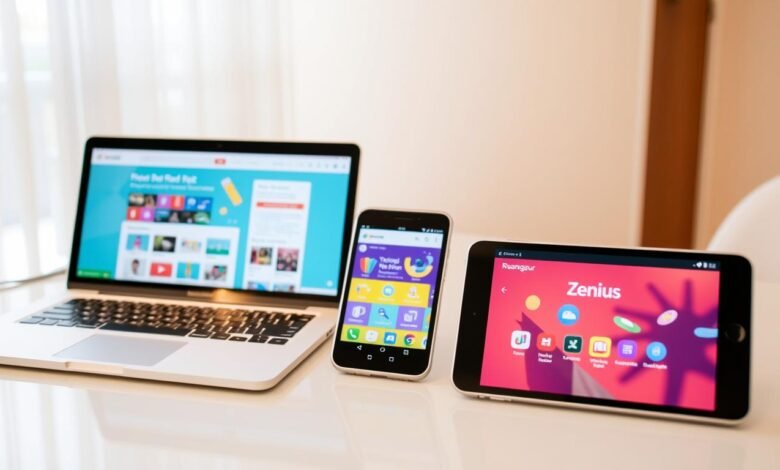
This digital revolution in education is particularly significant for Indonesia, where traditional educational infrastructure struggles to serve a population spread across diverse geographical regions. E-learning platforms now offer standardized, quality education regardless of location, democratizing access to knowledge and skills development for millions of Indonesians.
Key Platforms Driving E-Learning Growth in Indonesia
Indonesia’s e-learning landscape has flourished with innovative platforms catering to different educational needs. These digital solutions have transformed how students learn, teachers instruct, and institutions manage education across the country. Let’s explore the key players shaping this digital education revolution.
Ruangguru: Indonesia’s E-Learning Pioneer
With over 22 million users, Ruangguru has established itself as Indonesia’s leading e-learning platform. Founded in 2014, it offers comprehensive K-12 education through video lessons, practice exercises, and live tutoring. The platform’s success stems from its adaptive learning technology that personalizes educational content based on individual student performance.
Ruangguru’s mobile-first approach has been particularly effective in Indonesia, where smartphone penetration exceeds desktop usage. According to recent data, students using Ruangguru have shown an average improvement of 7.5% in academic performance, demonstrating the platform’s effectiveness in supplementing traditional education.
Ruangguru Features
- Video-based lessons with animated explanations
- Personalized study plans and progress tracking
- Live tutoring sessions with qualified teachers
- Practice questions aligned with national curriculum
- Exam preparation modules for national tests
Zenius Education: Deep Learning Approach
Zenius Education Highlights
- Concept-based learning methodology
- Critical thinking development focus
- University entrance exam preparation
- Comprehensive subject coverage
- Interactive learning assessments
Zenius Education differentiates itself through its emphasis on conceptual understanding rather than rote memorization. With over 80,000 video lessons covering primary to university-level education, Zenius focuses on developing critical thinking skills alongside academic knowledge.
“Our philosophy is to teach students how to think, not just what to think,” explains Sabda PS, Zenius Education’s Chief Academic Officer. “This approach has proven particularly effective for university entrance preparation, with Zenius students showing a 35% higher acceptance rate at top Indonesian universities compared to the national average.”
SEVIMA EdLink: Higher Education Solution
SEVIMA EdLink has emerged as a leading Learning Management System (LMS) for Indonesia’s higher education sector. Currently implemented in over 500 universities and colleges nationwide, this platform provides comprehensive tools for course management, student assessment, and academic administration.
SEVIMA EdLink offers institutions a customizable digital environment that integrates with existing university systems. Its features include virtual classrooms, automated grading, plagiarism detection, and detailed analytics on student performance. The platform’s ability to function with limited bandwidth makes it particularly valuable for institutions in areas with connectivity challenges.
Dr. Andi Wahyu, Director of Digital Transformation at Indonesia’s Ministry of Education and Culture, notes: “SEVIMA EdLink has been instrumental in standardizing digital education delivery across our higher education institutions, ensuring quality remains consistent regardless of an institution’s location or resources.”
Belajar.id: National Digital Learning Initiative
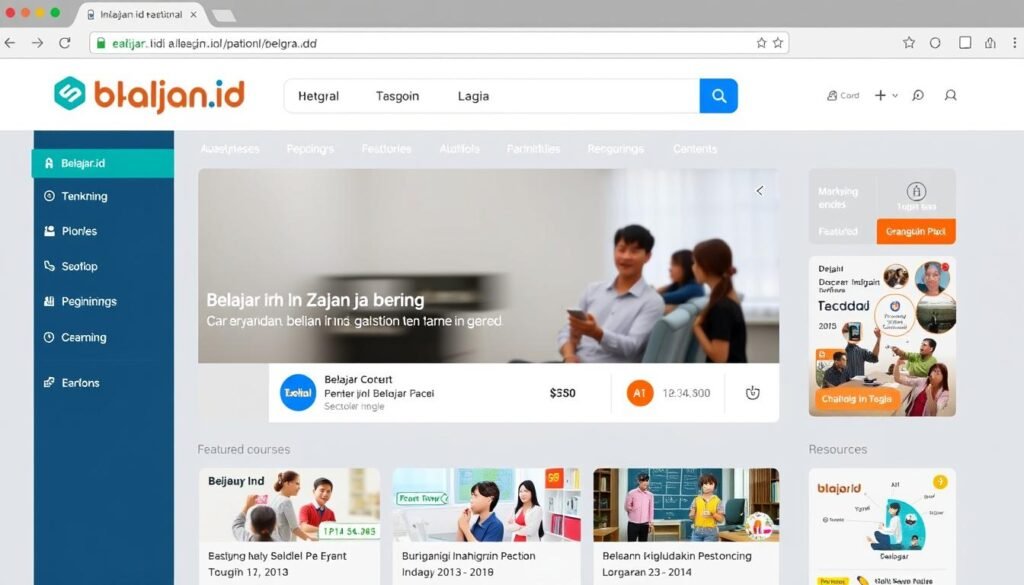
Launched by the Indonesian government in 2020, Belajar.id represents a nationwide effort to democratize access to quality education. This platform provides free access to curriculum-aligned learning materials for K-12 students across all provinces. With over 12,000 learning resources including videos, interactive modules, and assessment tools, Belajar.id serves as a digital educational backbone for the country.
Experience Indonesia’s National Learning Platform
Access free educational resources aligned with the national curriculum. Available to all Indonesian students and educators.
Technology & Methodology Powering E-Learning in Indonesia
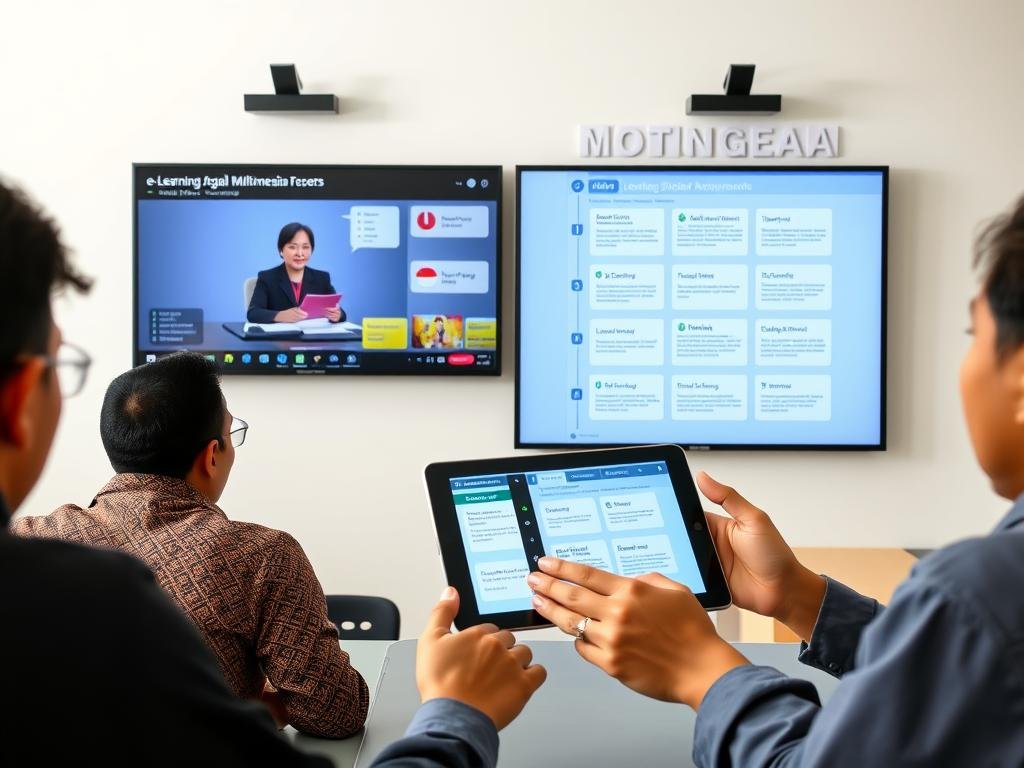
The technological infrastructure behind Indonesia’s e-learning revolution combines innovative teaching methodologies with digital tools designed to overcome the country’s unique challenges. These technologies enable personalized, accessible learning experiences that adapt to diverse student needs and infrastructure limitations.
Interactive Multimedia Learning Tools
Modern e-learning in Indonesia leverages diverse multimedia formats to create engaging learning experiences. Video lessons with animated explanations make complex concepts accessible, while interactive simulations allow students to experiment with virtual scenarios. Digital quizzes provide immediate feedback, helping learners identify knowledge gaps and focus their studies effectively.
These multimedia approaches are particularly effective in the Indonesian context, where visual learning helps overcome language barriers and varying literacy levels. According to a 2022 study by the Indonesia Digital Learning Association, students using multimedia-rich e-learning showed 23% better information retention compared to text-only digital learning.
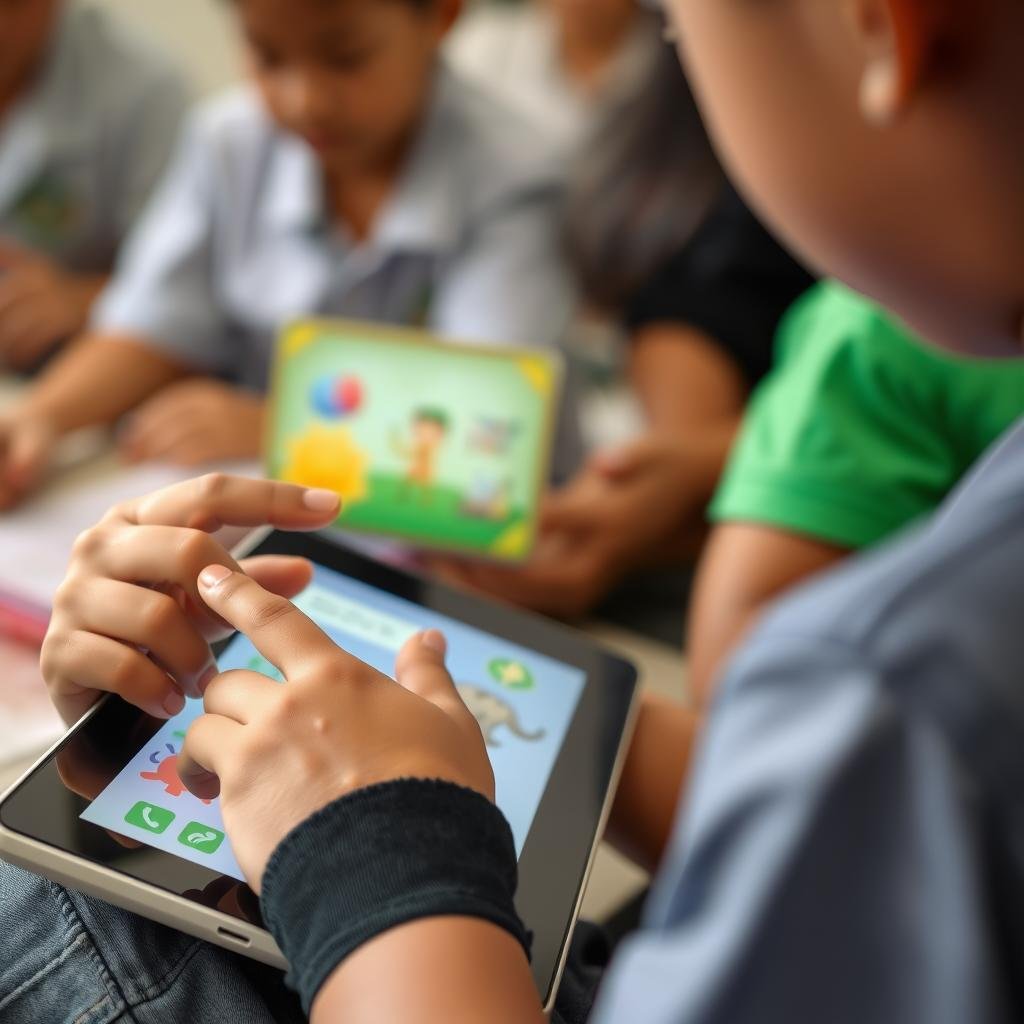
Learning Management Systems (LMS)
Learning Management Systems form the backbone of Indonesia’s e-learning infrastructure, providing comprehensive platforms for content delivery, student engagement, and progress tracking. These systems have evolved to address Indonesia’s specific challenges, including bandwidth limitations and diverse device access.
Key LMS Features Driving E-Learning Success
- Offline Functionality: Content downloading for areas with intermittent connectivity
- Mobile Optimization: Responsive design for smartphone-first users
- Data Compression: Reduced bandwidth requirements for video and interactive content
- Automated Assessment: Instant feedback and progress tracking
- Learning Analytics: Data-driven insights to personalize educational pathways
Adaptive Learning Technologies
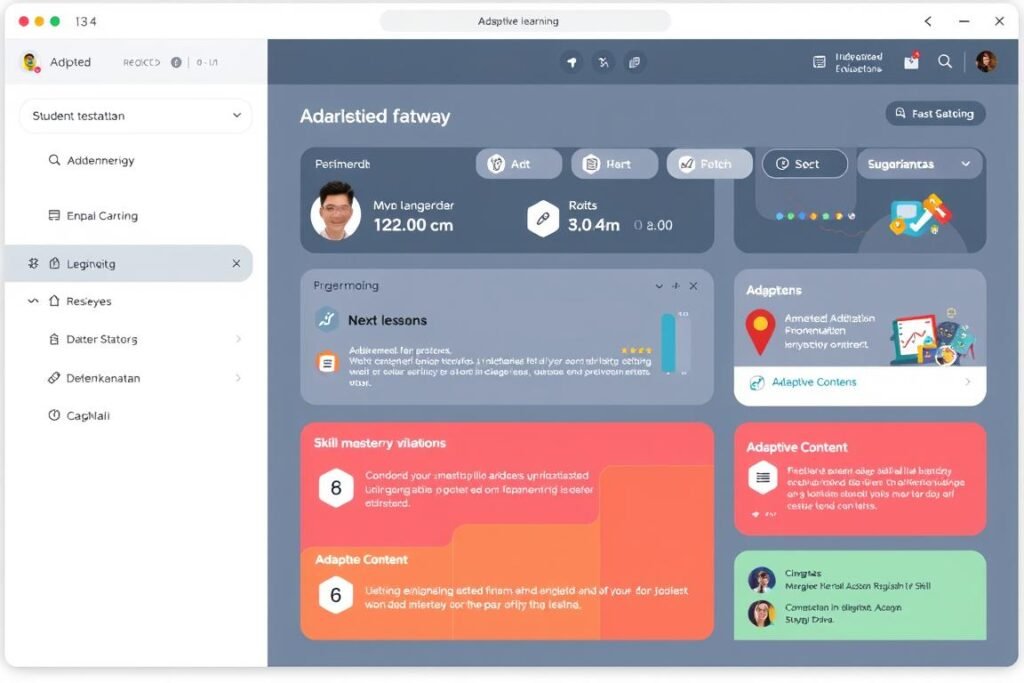
Adaptive learning represents the cutting edge of e-learning in Indonesia, using artificial intelligence to personalize educational experiences. These systems analyze student performance, identify knowledge gaps, and automatically adjust content difficulty and presentation to match individual learning styles and needs.
Platforms like Ruangguru and Zenius employ adaptive algorithms that create personalized learning pathways, ensuring students master foundational concepts before advancing to more complex material. This approach has proven particularly effective in Indonesia’s diverse educational landscape, where students come from varying academic backgrounds and preparation levels.
“Adaptive learning technology has transformed how we approach education in Indonesia’s diverse context. By personalizing content delivery based on individual student performance, we’ve seen comprehension rates improve by 31% compared to standardized approaches.”
Infrastructure & Inclusivity in Indonesian E-Learning
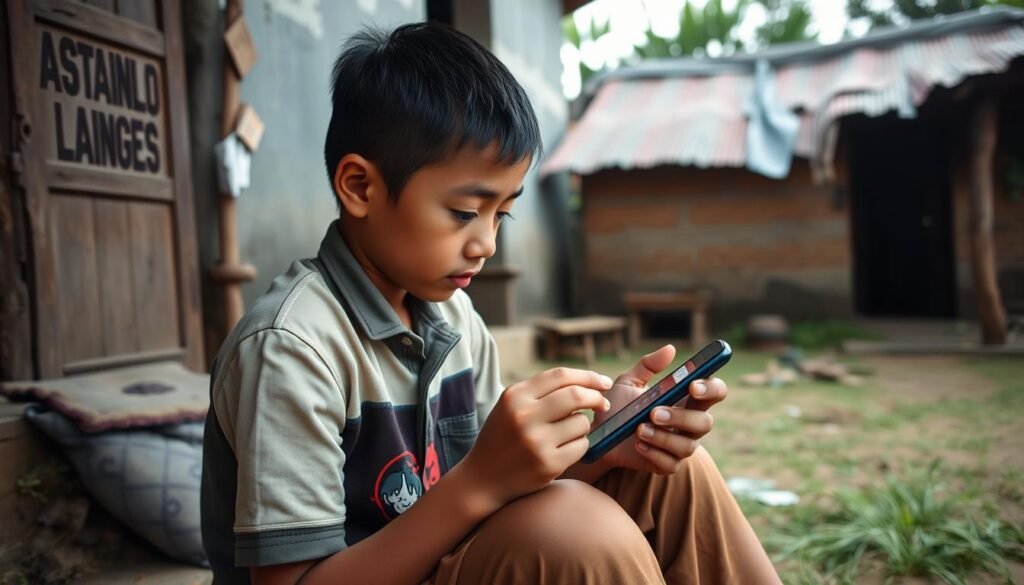
The success of e-learning in Indonesia hinges on addressing infrastructure challenges and ensuring inclusivity across the nation’s diverse regions. Recent years have seen significant progress in both connectivity expansion and the development of solutions designed for Indonesia’s unique context.
Internet Connectivity Improvements
Indonesia has made remarkable strides in expanding internet access, with connectivity reaching 73.7% of the population in 2023, up from just 47.7% in 2018. The government’s Palapa Ring project, a 35,000-kilometer fiber optic network spanning the archipelago, has been instrumental in bringing high-speed internet to previously underserved regions.
Mobile internet has proven particularly important for e-learning access, with 95% of Indonesian internet users connecting via smartphones. Recognizing this reality, major telecommunications providers have introduced education-specific data packages that offer affordable access to learning platforms without counting against regular data caps.
Internet Penetration Growth
| Year | Internet Users | Penetration Rate |
| 2018 | 124.8 million | 47.7% |
| 2020 | 175.4 million | 64.8% |
| 2023 | 204.7 million | 73.7% |
Bridging Educational Disparities
E-learning has become a powerful equalizer in Indonesia’s education system, helping to address the quality gap between urban and rural schools. Digital platforms provide standardized, high-quality content to all students regardless of their school’s resources or teacher expertise.
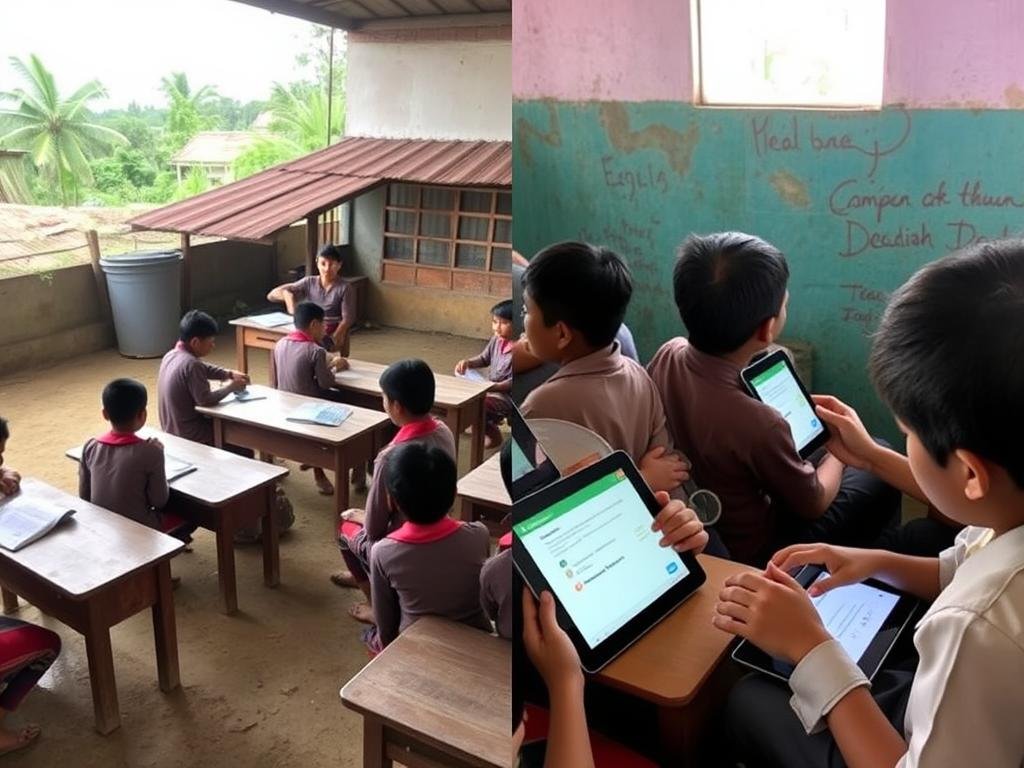
The Ministry of Education and Culture’s “Merdeka Belajar” (Freedom to Learn) initiative has embraced e-learning as a key component in addressing educational inequality. Through programs like “Guru Berbagi” (Teachers Share), educators from top schools create digital content that becomes available to students nationwide, ensuring quality instruction reaches even the most remote areas.
Success Story: Kampung Inggris Digital
In East Java’s remote villages, the “Kampung Inggris Digital” initiative has transformed English language learning through e-learning. Students who previously had no access to qualified English teachers now connect with instructors from across Indonesia and abroad through video lessons and virtual classrooms. The program has seen English proficiency scores increase by 45% in participating communities within just one year.
Offline Solutions for Limited Connectivity
Recognizing that internet connectivity remains inconsistent in many regions, Indonesian e-learning platforms have developed innovative offline solutions. These approaches ensure learning continuity regardless of connection status:
- Downloadable Content: Students can download lessons during connectivity windows for later offline use
- Low-Bandwidth Versions: Text-based alternatives to video content for areas with slow connections
- Offline-First Applications: Apps that function primarily offline and sync when connectivity becomes available
- Community Learning Hubs: Centralized locations with downloaded e-learning content accessible to entire communities
Future Outlook for E-Learning in Indonesia
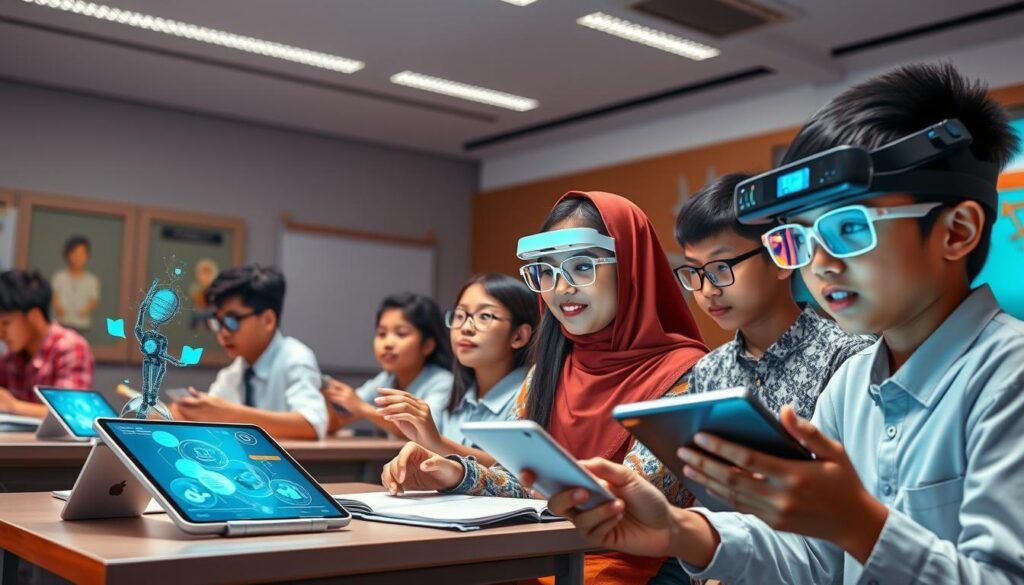
The future of e-learning in Indonesia looks promising, with emerging technologies and evolving methodologies poised to further transform the educational landscape. As digital infrastructure continues to improve and innovation accelerates, several key trends are shaping the next phase of e-learning development.
AI Integration and Personalization
Artificial intelligence is set to revolutionize e-learning personalization in Indonesia. Advanced AI systems will move beyond simple adaptive learning to create truly individualized educational experiences that consider not just academic performance but learning preferences, emotional states, and cultural contexts.
Indonesian startups like Pahamify are already developing AI tutors that can simulate one-on-one instruction, answering student questions in natural language and adapting explanations based on comprehension levels. These AI systems are being designed with multilingual capabilities to address Indonesia’s linguistic diversity, supporting learning in Bahasa Indonesia and regional languages.
Gamification and Immersive Learning
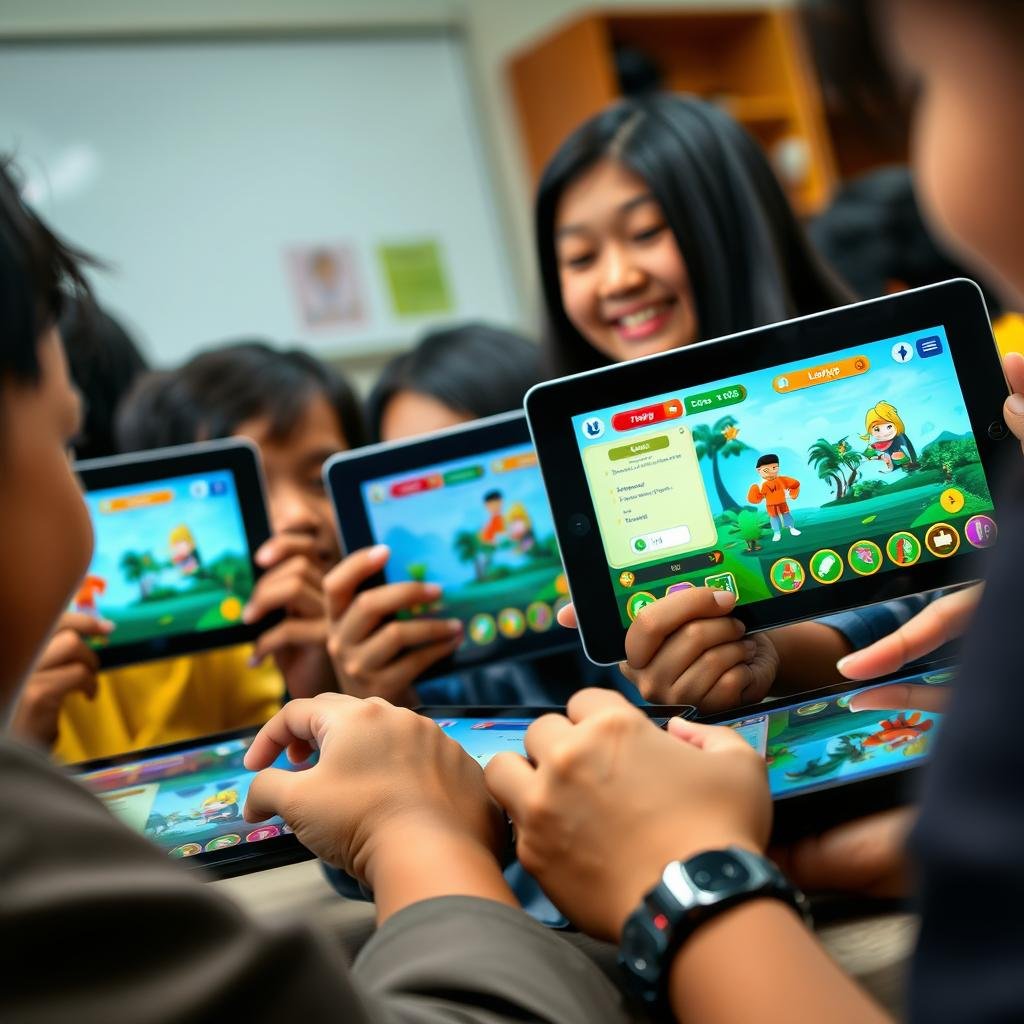
Gamification elements are increasingly being incorporated into Indonesian e-learning platforms to boost engagement and motivation. By adding point systems, badges, leaderboards, and narrative elements to educational content, platforms are making learning more enjoyable and habit-forming.
The next evolution will see more immersive technologies entering the mainstream. Virtual reality (VR) and augmented reality (AR) applications are being developed to create experiential learning opportunities that were previously impossible, such as virtual field trips to historical sites or 3D visualizations of scientific concepts.
Hybrid Learning Models
The future of education in Indonesia will likely embrace hybrid learning models that combine the best aspects of online and in-person instruction. These blended approaches recognize that while e-learning offers unprecedented access and flexibility, face-to-face interaction remains valuable for certain aspects of education.
Emerging hybrid models include:
- Flipped Classrooms: Students learn content online at home and engage in discussions and activities in physical classrooms
- Rotation Models: Structured schedules alternating between online and in-person learning
- Flex Models: Primarily online learning with in-person support available as needed
- Community-Based Blended Learning: Centralized physical locations where students gather to access online content with facilitator support
Public-Private Partnerships for Sustainability
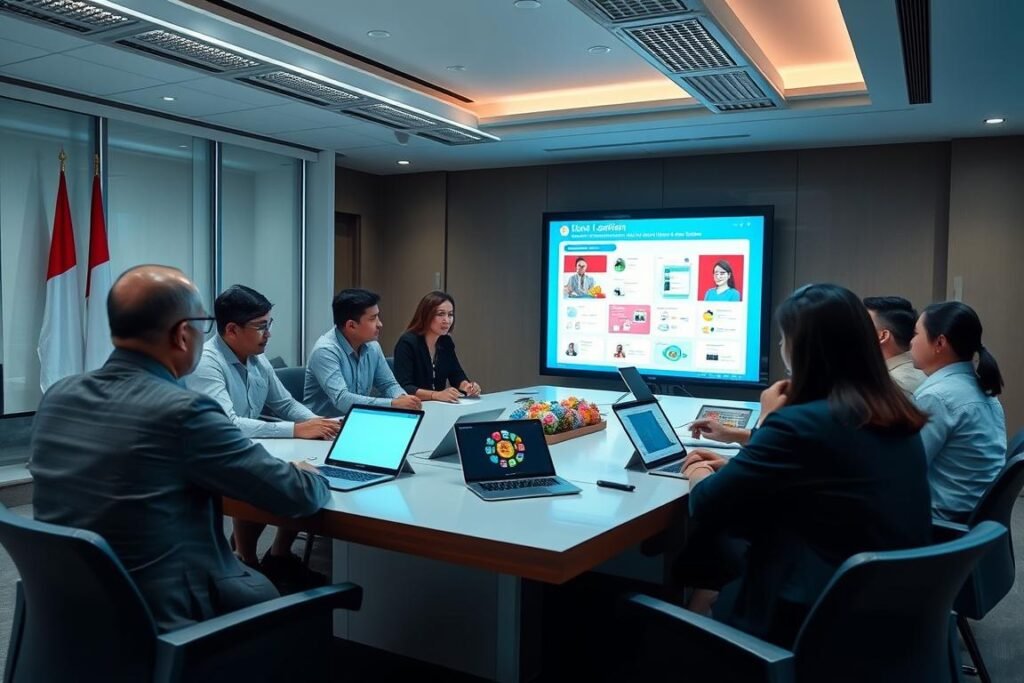
The sustainable growth of e-learning in Indonesia will depend on effective collaboration between government agencies, educational institutions, technology companies, and telecommunications providers. Public-private partnerships are emerging as the most effective model for addressing the complex challenges of digital education at scale.
The government’s role in creating supportive regulatory frameworks and baseline infrastructure is being complemented by private sector innovation and investment. These partnerships are focusing on critical areas including rural connectivity, teacher training in digital pedagogy, and the development of culturally relevant content that aligns with national educational standards.
Shape the Future of E-Learning in Indonesia
Join the community of educators, technologists, and policymakers working to advance digital education across Indonesia.
Conclusion
E-learning in Indonesia represents more than just a technological shift in education delivery—it embodies a transformative force that is democratizing access to quality learning across the archipelago. By leveraging digital platforms, adaptive technologies, and innovative teaching methodologies, Indonesia is addressing longstanding educational challenges related to geography, infrastructure, and resource distribution.
As internet connectivity continues to improve and digital literacy expands, e-learning will play an increasingly central role in Indonesia’s educational ecosystem. The integration of artificial intelligence, immersive technologies, and personalized learning approaches promises to further enhance educational outcomes and prepare Indonesian students for success in an increasingly digital world.
The journey toward fully realized digital education in Indonesia still faces challenges, particularly in remote regions where connectivity remains limited. However, the remarkable progress already achieved demonstrates the power of combining technological innovation with educational purpose. Through continued collaboration between government, private sector, and educational institutions, e-learning in Indonesia is poised to fulfill its promise of providing quality education for all, regardless of location or circumstance.
➡️ Baca Juga: Analisis Pasal-Pasal UUD 1945 dalam Perspektif Fiqih
➡️ Baca Juga: Efektivitas LMS dalam Era Kurikulum2013: Manfaat dan Implementasi





